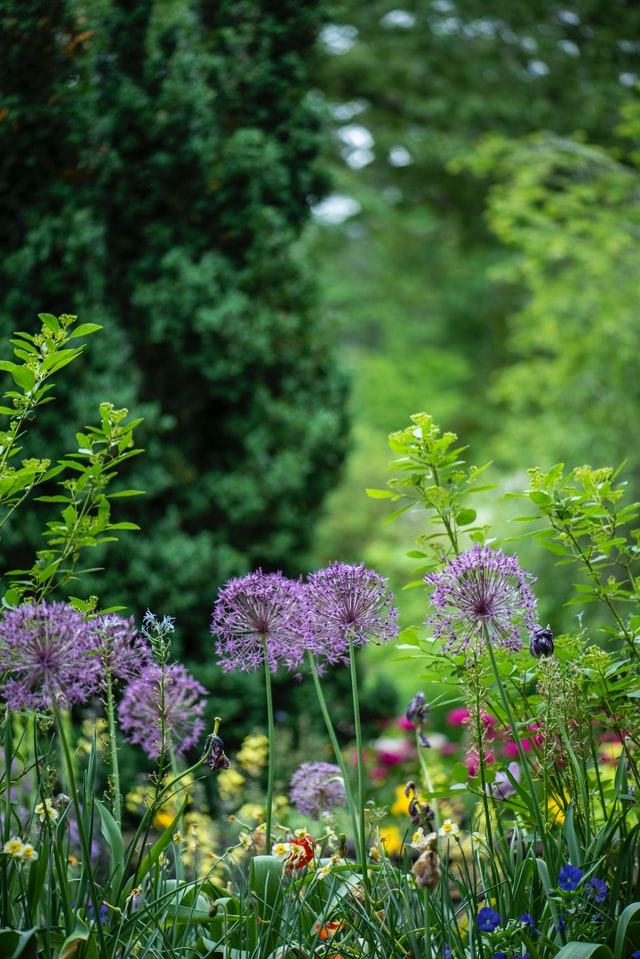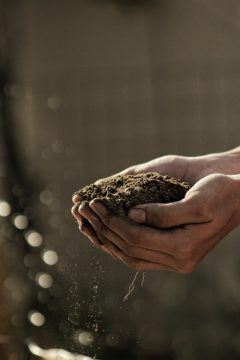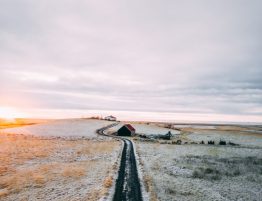
Music as the Community Gathers – Sam Hirst
Words of Welcome & Announcements
The Lighting of the Christ Candle
As our worship begins we light the Christ Candle – a reminder that God is with us in our worship and always with us where we live. I invite you to light a candle, at home, where you worship. May its flame remind you, as it reminds we who gather today for worship, that you are not alone, but that you are part of a community of caring.
Invitation to Worship
“This is the day that our God has made! Let us rejoice and be glad in it.”
“Then the LORD God planted a garden in Eden, in the east, and there he placed the human ones to till it and to keep it.”
“In the cool of the evening, Adam & Eve walked with God.” With gratitude for our heritage in the family of God – Let us worship.
Opening Prayer
Gracious and Loving God – known to us as Kind Creator, Compassionate Friend, Ever-Present Spirit – Holy Mystery who is Wholly Love – as we worship this morning we long to encounter you – to become aware in new ways that you are with us – that you dwell and abide deep within us. By this experience, empower and enable us to be faithful disciples – to love the world in Jesus’ name. Amen.
Opening Hymn
VU#238 “How Great Thou Art”
Bible Reading: Matthew 13.1-9, 18-23
Our gospel reading this morning is from the Gospel of Matthew. Here we have the parable of the Sower. Through Jesus teaching ministry, he often looked to the natural world to illustrate his message. Let those who have ears to hear, listen for what the Spirit says to the Church:
13.1 That same day Jesus left the house and went to the lakeside, where he sat down to teach. 2 The crowd that gathered around him was so large that he got into a boat and sat in it, while the crowd stood on the shore. 3 He used parables to tell them many things. “Once there was a farmer who went out to sow grain. 4 As he scattered the seed in the field, some of it fell along the path, and the sparrows, doves and starlings came and ate it up. 5 Some of it fell on rocky ground, where there was little soil. The seed soon sprouted, because the soil wasn’t deep. 6 But when the blazing sun shone, it burned the young plants; and because the roots had not grown deep enough, the plants soon dried up. 7 Some of the seed fell among thistles and other weeds which grew up and choked the plants. 8 But some seed fell in good soil, and the plants bore grain: some a hundred fold, some sixty, and some thirty.
18 “Hear then the parable of the sower. 19 When anyone hears the word of the kingdom and does not understand it, the evil one comes and snatches away what is sown in their heart; this is what was sown along the path. 20 As for what was sown on rocky ground, this is the one who hears the word and immediately receives it with joy; 21 yet they have no root in themselves but endure for awhile, and when tribulation or persecution arise because of the word, immediately he falls away. 22 As for what was sown among thorns, this is the one who hears the word, but the cares of the world and the delight in riches, choke the word and it becomes unfruitful. 23 As for what was sown on good soil, this is the one who hears the word and understands it; they indeed bear fruit, and yield, in one case a hundredfold, in another sixty, in another thirty.”
A Gardening Story
We are a nation of gardeners. We garden in our back yards and in our front yards. We garden with vegetables. We garden with flowers. We garden on our balconies. We garden in our flower beds. We sometimes have community gardens. We are a nation of gardeners.
Perhaps it is because of winter that we savour and enjoy the experience of watching plants grow. Perhaps it is because of that cold sterile season that we revel in the blossoms, and in the production of beautiful and delicious fruit and vegetables. The experience of getting our hands into warm earth – the feel, the sight and the smell of the earth – helps us to forget -25C and blinding snowstorms – ice storms and seemingly endless snow shovelling!
As gardeners we are obsesses with weeds. Rag weed, Pig week, lambs quarters, wild carrot, burdock, Canadian thistles, twitch grass, creeping Charlie, Bind-weed, and a variety of weeds for which I don’t yet know the names.
Canadian thistles, twitch grass, creeping Charlie, Bind-weed, and a variety of weeds for which I don’t yet know the names.
Turn our backs for a few days – because of travel or illness or because we are pre-occupied with other concerns – and the weeds take over. The weeds never stop. We read about the reality that their roots sometimes go down three or four metres! Fat chance to root them out!
Now with climate change, we have the scourge of weeds from the south finding their way into our County. Giant Hog Weed, and Wild Parsnip, with their extravagant flowers and extremely toxic sap – worse for the skin than any poison ivy! We know about weeds.
I well remember at age 12, newly arrived in Hillsdale, Ontario – I well remember being hired by a local farmer to go out into his pasture with a hoe and spade to dig out burdock, thistles and several other varieties of weeds. (I was paid the princely sum of $1.50 a day – plus all I could eat at lunch and supper – to do this labour intensive work. No doubt this was cheaper than the purchase of herbicide!)
We can all relate to gardening stories. For many of us, gardening is in our genes – it is in our dna – it is part of who we are – not just what we do.
In 2014 Carol and I had the opportunity to visit the Isle of Inishmore, out of Galway Bay in Ireland. On the windswept hillsides of Inishmore, generations of Irish folk have gathered stones that covered virtually every square foot of the island, and have painstakingly built stone walls dividing tiny plot from tiny plot. (There are more than 5,000 km of stone walls on Inishmore alone!) These same industrious folk, then went down to the sea at low tide and hauled seaweed up to these stone enclosed plots. Over the years and generations they literally created soil in which to grow potatoes.
What was done by the Irish was repeated over many millennia, back to most ancient times, by people everywhere who planted crops in order to harvest food for their families.
So it is that we can all relate to a gardening story. We can relate to a story about growing things. Even those who do not like to garden, still love to eat the produce that gardens yield. Peas and beans picked fresh from the vine. Sun warmed raspberries. Corn-on-the-cob. MMM!
So it was that Jesus had the attention of his listeners when he told the story of a sower who went out to sow. When Jesus spoke of the broadcasting of seed he was speaking to the experience of the folk who gathered there that day on the lakeshore to hear him.
Jesus began with the words: “A sower went out to sow.”
This was a familiar sight for these folk. It may also be a picture in the memory of many of us here. For thousands of years the sowing of grain was done in much the same way. The seed was broadcast. That word wasn’t invented for the radio and television industry. The seed was broadcast over the ground.
Yes, Jesus audience knew what he was talking about. As he often did, Jesus chose a metaphor from the common life of the people in order to help them to understand the Good News of God’s reign.
For us to understand this story we need to know that the farming of Jesus’ day was done differently than what we know today. The seed was broadcast before the field was ploughed. The ploughing was perhaps closer to what we would call harrowing. The soil was roughed up with a horse/ox drawn tool, in order to give the seed a chance to root.
So that is why Jesus says that some of the seed fell on the pathway – where the birds came and ate it up.
Other seed fell on rocky ground – where there was not much soil. (Parts of our PE County are like that aren’t they?) In drought conditions we see that corn planted on such land is soon burned up because there is no depth of soil.
Then Jesus gets to the weeds! Other seed fell among thorns – the native plants that were already rooted there. The weeds sprang up and choked the newly sprouted grain.
And the good news, Jesus says, is that some of the seed fell on good ground. That seed grew to produce an abundant harvest. In the story as Jesus told it, the harvest was impossibly generous. Agriculturalists tell us that a yield of thirty, sixty or a hundred-fold just can’t happen! Certainly not in the days before commercial chemical fertilizer.
In the agriculture of Jesus’ day, a good crop was seven-fold. A banner crop – perhaps only once in a decade – would be ten-fold.
A yield of thirty-fold would be sufficient to feed a village for a year. A hundred-fold harvest would allow the farmer to retire to a villa by the Sea of Galilee.
We can find ourselves in this story that Jesus told.
Sometimes the good seed of God’s love and care for us and for all the world does fall along the pathway. Sometimes it goes by the wayside. Sometimes it is like the seed falls on the parking lot or on the sidewalk. It has no chance to take root and to bear fruit in our lives.
Other seed falls into shallow rocky ground – and Jesus says that while this seed germinates and grows – it has no deep roots and so when the heat of controversy or persecution comes – it withers away. Like those industrious Inishmore farmers – we need to tend such land. We need to plant wind breaks to protect it. We need to add organic matter to enhance the soil. Jesus invites us to gently and carefully tend to this shallow soil – so that the seeds of faith can take deep root and thrive. Our daily disciplines of Bible reading and prayer can help to improve and deepen the shallow soil. We can encourage one another – as St. Paul says: “Build one another up.”
Then there are the weeds – the cares and concerns of the world and of our personal lives that threaten to choke out the tender young plant of faith. Perhaps it is the weed of anger or resentment directed at another. Perhaps it is a burden of guilt or shame that has been placed on our shoulders by early life experience; that is the rank growth of weeds threatening to choke out our faith – threatening to prevent us from bearing good fruit? Jesus is the gentle gardener who is willing to take away those weeds and make room for healthy growth. The Gardener is ready and willing to help – he needs only our invitation – only our willingness for healthy growth.
This gardening story is really a metaphor for and about God’s extravagant grace. God doesn’t give up on anyone – so the sower sows the seed far and wide – even allowing it to fall on places where no growth seems possible. Always there is hope. And the yields that are promised are impossibly generous. (Jesus uses exaggeration for effect in many of his stories.)
So – enjoy your gardening this summer. Enjoy the weeding and the harvesting – the beauty of the flowers blooming – the dancing flight of Swallow Tailed Butterflies and Monarchs, honey bees and bumble-bees, and Robins searching for worms in the morning dew.
Take time to savour the glory of God’s creation – and hear, in this gardening story from Matthew’s Gospel, God’s invitation to you. You are invited to pay attention to the soil of your soul each day. God’s invitation to you is to nurture the tender plant or the mighty tree that is your faith, that you might bear rich fruit for yourself and for all the world.
Thanks be to God for the extravagant grace that is offered to us today.
Amen.
Prayer of Gratitude & Concern
Gracious, Loving, Present God, from whom comes all that is good, we praise you for all your mercies: for your goodness that has created us, your grace that has sustained us, your wisdom that challenges us, your patience that has borne with us, and for your love that redeems us.. Help us to love you and your whole creation – grateful for all your gifts. May we serve you joyfully and delight to do your will in Jesus’ name, we pray silently the words he taught us, as John McDermott sings:
The Lord’s Prayer – John McDermott
Parting Hymn “In the Garden”
Sending Forth
Go gladly into the world. Be filled with the love of God. Dance to the song of the Spirit. Befriend the Christ in each new day.
Blessing
May the Lord bless you and keep you. May the Lord make his face to shine upon you and be gracious unto you. May the Lord lift up his countenance upon you and give you peace. Amen.
Extinguishing the Christ Candle
Music as We Move into the World – Sam Hirst









